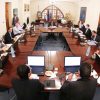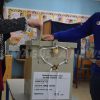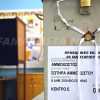A few months before the official declaration of Cyprus Independence, political leadership and citizens were called for the first time to determine their own future, electing the first President of the newly formed Cypriot state. In February 1959 the first ballot boxes were set up to elect the highest state official for the next five years. A process unknown and unprecedented, especially for the period before the vote.
With the help of two people who lived through the first hours of the establishment and subsequent operation of the Cypriot state, we will make a historic journey of 59 years, every five years, to the top moments of the Republic of Cyprus which is the election of the President. Nikos Kosis, a fighter of EOKA 55-59, lived close to the first electoral contest that elected Archbishop Makarios III as the first President. In one hour of narration, the memories that are recalled take us to a time that can hardly become familiar, but which laid the foundations for the operation of that regime.
Especially for someone who has experienced the first steps of the Republic but also its coming of age, then the comparisons that inevitably are made refer to a time when its main feature was personal contact. Electoral contests were not excluded from this feature either. Nikos Kosis recalled that the pre-election scenario for the election of the first President was set.
Door-to-door voting
At the core of Archbishop Makarios' candidacy were EOKA activists, as Mr. Kosis recalls. Unlike today at that time, the candidate did not have a leading role and presence during the election campaign, with few exceptions. The burden of the election campaign fell on the backs of a group of close associates of the candidate who, as Mr. Kosis told us, were threshing Cyprus from door to door, village to village, squares and cafes. For the needs of the pre-election campaigns, the "staff" of each candidate had a selected group of people who had the task of writing the speeches used by the speakers on their tours.
Tassos Papadopoulos, Frixos Petridis, Andreas Christofidis and high school teachers had taken over the task of writing the speeches in the "staff" of Archbishop Makarios. Speakers were selected well-known activists of EOKA but also well-known citizens close associates of Makarios, such as Polykarpos Giorkatzis or Glafkos Clerides. The speeches were almost identical and the speakers spoke them with the help of megaphone on cars. "Back then, contact with the voter was more humane, resulting in relationships and friendships." The duration of the pre-election period, as he told us, did not exceed two months. "Then we did not wait for the people to come, we went to them," recalls Mr. Kosis.
On the balconies and squares
After 1974 the electoral contests were put on a new basis. Large outdoor gatherings were added to the tours around Cyprus. The creation of parties contributed significantly to the evolution of the electoral profile and behavior of the candidates. Without canceling the logic of personal contact, especially in rural areas, parties and candidates turned to the larger masses of the population, a shift that led them to the balconies and squares of urban areas.
The journalist Panagiotis Papadimitris who covered electoral contests from the second Presidential Elections of 1968 and onwards remembers the first large gatherings in Nicosia with the transfer of fans from all over Cyprus since the element of impressions had entered the search for votes for good. The Alarm in PASYDY Square, in Eleftherias Square DIKO and EDEK and AKEL in Kolokasi with the journalists running from gathering to gathering to cover them but mainly to find out the biggest one. During the final rallies, candidates and parties mobilized buses to transport people.
The 1968 elections
According to Mr. Kosis, the pre-election climate was mild without much tension, with the exception of the 1968 elections. "Things were done by people who normally had no reason to do so. Eggs were thrown at Takis Evdokas, a rival of Archbishop Makarios. It was an electoral contest that entered another base with controversy. "Sometimes there were incidents of extremism, but in general, there were no rivalries between the people." For the 1968 elections, Mr. Papadimitris, in addition to the provocations, recalled that Takis Evdokas had asked to appear at RIK without being allowed to do so. The pre-raids, as he told us, took place at his final pre-election rally in Solomos Square. "They put Giorkatzis' youth on him and made glasses and nails."
The 1993 elections
For Panagiotis Papadimitris, the 1993 elections, where Glafkos Clerides was elected in the second round, were the toughest presidential contest he experienced. As he explained to us, the late President of the Alarm for the second time was claiming the Presidency of the Republic from George Vassilios. "Then the knives came out for EOKA B '. They used to say to AKEL: Kotsianias, Clerides Kotsianias and Denktas ".
Suspicions of fraud
Even in the first years of the Presidency, there were suspicions of electoral fraud, says journalist Panagiotis Papadimitris. "There were ballot boxes that transported them to Nicosia from remote areas, such as Pyrgos. The counting was then done at the offices of PASYDY. "But until they arrived, there were rumors that ballot changes were made along the way by those who carried them, who had the seals to close them later."
Press and elections
With few media outlets at the time, the press, as journalist Panagiotis Papadimitris remembers, played its own role. The same young journalist in the 1968 elections went to Famagusta for the first street poll for his newspaper, facing a variety of public reactions, but his research was never published and he himself fell victim to the prevailing polarization. Making a comparison of that time with today, in terms of the press, Mr. Papadimitris considers that today is the era of "innocence". He recalled the front pages of some newspapers in the first elections calling on the citizens to throw "Black on that candidate" accusing him, with heavy expressions such as "Knights of the Order of the Mass" or "Lumbar".
The tables
Especially in the first years, the candidate staffs, and later the parties, took care to provide every facility to their voters, even outside the polling stations on election day. Everywhere, as Mr. Kosis and Mr. Papadimitris told us, tables were set up for any kind of help. The main concern was the supply of the appropriate ballot paper thus controlling the voting.
The Presidential matches
-Presidential Elections 1959.
Candidates: Archbishop Makarios, Ioannis Clerides.
Elections: 13/12/1959
Elected: Archbishop Makarios with a percentage of 66,29%.
-Presidential Elections 1965
They were postponed due to the inter-communal riots of 1963/1964
Extension of the term of office of President Makarios for three years.
-Presidential Elections 1968
Candidates: Archbishop Makarios, Takis Evdokas.
Elections: 25/12/1968
Elected: Archbishop Makarios with a percentage of 96,26%.
-Presidential Elections 1973
Elections: 18/02/1973
Archbishop Makarios was elected without a rival.
He remained in the presidency until his death on August 3, 1977.
- Election of the President 10/09/1977
With the prudence of all political forces, Spyros Kyprianou was elected for the rest of Makarios' term, until February 1978.
-Presidential Elections 1978
Elections: 5/2/1978
Election of Spyros Kyprianou without a rival.
-Presidential Elections 1983
Candidates: Spyros Kyprianou. Glafkos Clerides, Vassos Lyssaridis.
Elections: 13/2/1983.
Election of Spyros Kyprianou with a percentage of 56,54%.
-Presidential Elections 1988
Candidates: George Vassileiou, Glafkos Clerides, Vassos Lyssaridis, Thrasos Georgiadis.
Elections: Two rounds. 14/2, 21 / 2-1988
George Vassilios was elected with a percentage of 51,6%.
-Presidential Elections 1993
Candidates: George Vassiliou, Glafkos Clerides, Paschalis Paschalidis, George Mavrogenis, Giannakis Taliotis.
Elections: Two rounds 7/2, 14 / 2-1993.
Glafkos Clerides was elected with a percentage of 50,31%.
-Presidential Elections 1998
Candidates: Georgios Iakovou, Glafkos Clerides, Vassos Lyssaridis, Alexis Galanos, George Vassilios, Nikos Koutsou, Nikos Rolandis.
Elections: Two rounds 8/2, 15 / 2-1998
Glafkos Clerides was elected with a percentage of 50,82%.
-Presidential Elections 2003
Candidates: Tassos Papadopoulos, Glafkos Clerides, Alekos Markidis, Nikos Koutsou, Andreas Efstratiou, Christos Iosifidis, Adamos Katsantonis, Costas Kyriakou, Georgios Mavrogenis, Pantelis Sofoklis.
Elections: 16/2/2003
Elected: Tassos Papadopoulos with a percentage of 51,51%.
-Presidential Elections 2008
Candidates: Ioannis Kasoulidis, Dimitris Christofias, Tassos Papadopoulos, Marios Matsakis, Costas Kyriakou, Costas Themistokleous, Andreas Efstratiou, Christodoulos Neophytou, Anastasis Michael.
Elections: Two rounds 17/2, 24 / 2-2008
Dimitris Christofias was elected with a percentage of 53,36%.
-Presidential Elections 2013
Candidates: Nikos Anastasiadis, Stavros Malas, George Lillikas, Georgios Charalambous, Praxoula Antoniadou-Kyriakou, Lakis Ioannou, Loukas Stavrou, Makaria - Andri Stylianou, Solon Grigoriou, Costas Kyriakou, Andreas.
Elections: Two rounds 17/2, 24 / 2-2013.
Nikos Anastasiadis was elected with a percentage of 57.48%.
Source: KATHIMERINI





